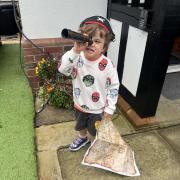Clonter Opera Theatre at Swettenham, near Congleton, is 50 years old in 2024 and it needs your support to carry on its work in championing of young musicians, and its contribution to the Arts.
It's almost half a century since Jeffery and Anita Lockett hosted the first charity concert at their home, Clonter Farm at Swettenham Heath, near Congleton. In July 1974, friends and neighbours were invited to an operatic picnic in aid of Cancer Relief. Jeffery joined the performers, along with the Abbey Opera Group, led by Mary Hill.
The auditorium was hastily constructed in a barn previously been used to store hay, livestock and machinery. Tiered seating was created with hay bales and audiences advised to bring rugs – and insect repellent. Hay fever sufferers sat near the fire escapes. The box office was a shoe box on the kitchen table.

Jeffery and Anita had such a good reception, they decided to keep on going.
By 1983 Clonter’s operatic picnics were firmly established and there was a demand for more performances. Jeffery set about converting the barn into a permanent theatre that now comprises a 400-seat auditorium, with undercover dining facilities and a licensed bar accompanying the stage and orchestra pit.
In 1989 Clonter put on a complete opera, for the first time, performing Eugene Onegin.
Early supporters included the music critic Michael Kennedy who championed Clonter for many years and strong links were formed with teachers and emerging artists from the Royal Northern College of Music in Manchester.

Education became a huge part of Clonter's success story, and an outreach programme for schools in the North West was started. An active board of trustees raised funds to help Clonter Opera Farm launch its first Opera Studio with Leonard Hancock as music director. He and Wyn Davies coached the singers, Patrick Libby, Sally Day, Patrick Mcguigan and Sheila Barlow were amongst the early stage directors.
Music directors Michael Rosewell, Anthony Legge and latterly Clive Timms succeeded Leonard Hancock. Simon Keenlyside, Mary Plazas and Amanda Roocroft came to Clonter while still students at the RNCM. Simon later became president of Clonter Farm Music Trust.
Fifty years on from that first season, Clonter is known as 'the Glyndebourne of Cheshire', a cultural destination offering a rich and diverse programme of live music.

Still family-run, and with Jeffery and Anita at the heart of things, it remains a centre for innovation, celebrated across the industry. But, like many other cultural organisations, it is struggling with a lack of funding, to the point where help is needed to get it through its 50th season.
'I think I was seven that first year, and it's been a part of my family for as long as I can remember,' says Isabella Locket, one of Jeffery and Anita's daughters, who is now the theatre's general manager.
'I came back for six months in 2012 to help out in a crisis, and after we fixed that crisis, along came another one, and 11 years on I'm still here,' she says.
The current crisis is a financial one, stemming from a cut in UK and European funding to the arts.
'I hate to stand, begging bowl in hand, but the truth is we need to fill the gap left by the subsidy we lost from Creative Europe, the EU programme supporting the arts,' she says.
'We're hanging on by our fingernails, and as we approach this 50th year, the main focus is just on keeping going. We've had some very generous donations from legacies, but what would make a huge difference is if a large number of people could each give a small amount.

'For example, we have almost 2,500 people on our mailing list. If they all became Friends of Clonter we'd have £139,000 in the coffers and our future would look very different.'
Clonter isn't alone in its struggle – a 34 per cent drop in Arts Council funding for opera alone in the UK has resulted in a lack of opportunity for emerging operatic talent, something the East Cheshire arts organisation has excelled at over the years, being seen by many as a finishing school for new performers and technicians. One look at its website's 'where are they now' section shows that a huge number of future stars cut their teeth at the rural Cheshire theatre, and the Lockett family has actively encouraged the idea that Clonter should be a stepping stone for emerging singers between their conservatoires and the profession.
Directors Jamie Hayes, Martin Lloyd Evans, Michael McCaffery, Victoria Newlyn and Geoffrey Saunders became regular collaborators in the theatre's roductions, as did designers Elroy Ashmore, Nick Barnes, Peter Ruthven-Hall, Eleanor Wdowski and lighting designer Alexandra Stafford.

'We also run talent development opportunities for young people through our Emerging Artist and Education Programmes,' says Isabella. 'Around 32,776 children and teachers have been able to take part in the education outreach alone since 1990. This year 2,014 children and teachers, and 237 creative practitioners – of whom 55 are emerging artists – are due to take part in events at Clonter.
'There is also a serious lack of resources for the arts in education and a lack of provision for the growing number of home-educating families. The number of young people taking arts GCSE subjects has dropped by 44 per cent since 2010,' says Isabella.
'Clonter is currently hosting eight theatre arts days for 412 children and 64 educators. The future is bright for the creative arts in the UK, if only the imagination, enthusiasm and creative collaboration, displayed in these workshops, is allowed to develop.
'Tickets are free for anyone 26, or under, for all Clonter events in the auditorium this year, enabling them to experience quality live music of all genres.'
As well as working with young people, Clonter actively tries to help the older generation at dementia-friendly musical teas with songs from the shows, and a focus on keeping their most isolated audience members entertained and connected.
'The stimulation and enjoyment of live musical entertainment is proven to enhance our health and wellbeing,' says Isabella.
'Really, they should put it on prescription.'
'We have been so fortunate over the years, with such wonderful support, but it is horribly fragile,' explains Isabella. 'People say to me "oh we can't make it this time, but we are so much looking forward to next year". I don't have the heart to tell them that without them coming this time, we might not be here next year.'
If you enjoy going to Clonter and would like to support its work, you can do so by contributing to the URGENT Let Us Be 50 Appeal either by making a donation or by becoming a Friend or Patron. If you work or are involved with a company or are an individual interested in sponsoring an event, or could introduce Clonter to other charities who share its aims, please email appeal@clonter.org
Clonter Opera Theatre, Swettenham Heath, Trap Road, Congleton CW12 2LR



























